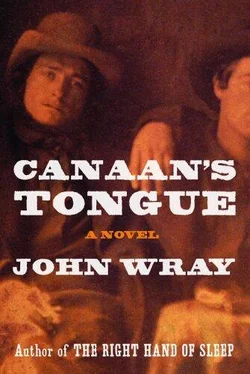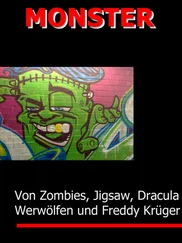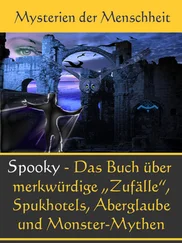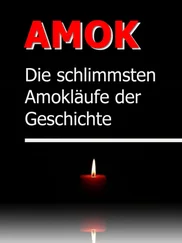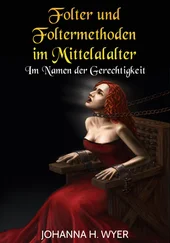It’s darker at the bottom than I’d expected. Foster’s breathing, slow and steady as a sleeper’s, comes from every side at once—: if not for the light from the open door I’d be done for. The room has no depth to it, no boundary, no form. But I have no intention of squandering my advantage. I work quickly and methodically, making forays to each side in search of Foster, returning always to the dim square of light at the base of the steps.
I’ve covered half the cellar, near as I can judge, when the door is quietly pushed shut.
A GROAN ESCAPES MY LIPS as the last light vanishes. The sound is mimicked by the prisoner, suddenly close beside me. A tremendous desire to bolt overtakes me, to exchange the dark of the cellar for the paler dark outside—; but I’ve lost all sense of where the steps might be. The prisoner’s breathing is louder and more urgent than before, as though he meant to guide me to him. I walk in a slow, in-curving spiral, expecting to reach him in a few short steps—; but the sound proves hard to follow, and I soon grow dizzy. I’ve just decided to stop a moment, to recover my balance and my breath, when my left hand brushes against a sack-cloth sleeve.
“Aaaah,” says the prisoner. My hand whips back as though he’s bitten it. A body ought to give when touched, no matter how slightly—; but the arm under that shirt-sleeve was as rigid as mahogany.
I stand motionless in the dark, in Lord knows what attitude of terror or disgust, mustering the courage to press on. The prisoner makes no attempt to move. His breathing has grown quieter, more restful. Gritting my teeth, I lay my fingers first on his forearm, then on his shoulder, and then, in the manner of the aged and the blind, lightly on his forehead and his face.
The heel of my palm comes to rest on his chin—; his breath whistles through my fingers, tickling them. My middle finger traces the bridge of his nose, which I remember as high and peaked. The index finger traces the hair-line, the ring-finger the rim of his left eye-socket. The face stays fixed throughout, its breathing regular as clock-work. It’s Foster. I’m certain of it now.
“Foster,” I whisper, barely opening my mouth. “Can you hear me? This is Virgil Ball.”
“Aah,” says Foster’s face.
“I’m going to liberate you, Foster. I’m going to get you out of here.”
No sooner have I said this than the breathing stops completely and his body snaps taut as a cable, flinging my hand away. The silence that follows is so absolute that I can hear his body shuddering. With a great effort of will I bring my fingers back to his face and find it convulsing wildly, as though the blood and ichor under the skin were coming to a boil.
In the next instant the mouth has formed a syllable, a name, and I’m stripped of my last understanding.
“Ball!” it says. It says my name plaintively — imploringly — and I recognize the drawl I first heard under a revival tent ten years ago—: the cane-sugar patois of the Delta flats. The voice that effortlessly, coyly, playfully undid my life.
“Morelle?” I stammer.
The body heaves and spasms. It was Morelle’s voice without question. A single word was enough to know it by. My hands make their way from the face to the throat, probing for its hollow. My left thumb finds its mark and my right joins it dutifully. I open my eyes wide — as if to reassure myself of their sightlessness — and drive both my thumbs in with all my strength.
Choked shrieks issue from the mouth, bestial and dull, but the body itself obliges me. Water begins to stream out of its eyes, running down onto my hands, but I do not mistake this watering for weeping. The darkness comes to my aid, helping me to forget the man before me, forget Morelle, forget even myself, and remember only Parson’s words—:
He’ll come to you painlessly, Mr. Foster. Through your open mouth.
I STAND IN THE DARK for I know not how long, throttling the prisoner. My thoughts begin to stray toward the future, and I see that I’ll suffer for this act as sure as I’m alive. The knowledge does nothing to discourage me, however. Every detail of the present moment — the heat, the dampness, the bleatings of the expiring body, the absence of all light — holds the promise of release, of expiation. Only strangling myself could bring me greater peace.
This man has never committed the least crime against me. He’s as near to an innocent as can be found in this house. And it’s this very fact — the arbitrariness of his killing — that lends the cold beauty of religion to my act. I feel sanctified, righteous—: a latter-day Abraham, holding Isaac aloft to heaven. Is this what the Christian martyrs felt? The knights of the Inquisition? The Union generals? What else could religion be, at its core, but this—: the cold-blooded sacrifice of an innocent, that an entire nation might be saved?
The beauty is enough to sear the lining of my soul. I am ready to wage war against the entire world in defense of this one idea.
A MOMENT LATER I STEP BACK from the body in disgust. The life has gone out of it like wind out of a sheet. The conduit, such as it was, is closed.
I have no time to reflect on this, however. The cellar door flies open without warning, fixing me in its sudden light like a butterfly on a pin. Parson has found me out, as I knew he would—; he’s smelled Foster’s killing, tasted it on the air, and come scurrying down from his attic to destroy me. I can’t laugh at this notion any longer, can’t shame myself into dismissing it as I might once have done. I have faith in Parson’s witchery now—: I must. If Parson has no power but that of superstition, no gift but that of cunning, then I’ve just murdered a man on their behalf.
I’m about to step forward, to challenge him at last, when Clementine’s silhouette appears in the door-frame. The air spills out of my mouth like water from a jar.
She stands raptly in the light, shifting from one foot to the other, believing herself unseen. Clementine, not Parson. I remain as I am, lifeless as the corpse beside me, cowering from the creature who was once my life.
HE’S THERE, JUST AS PARSON SAID HE WOULD BE. I knew he’d be there. I didn’t need Parson to guess that he’d be drawn to that cellar like a puppy to its mess.
He stands cowed and huddled, blinking up at me, with his feet in the light and his fingers in his mouth. Like a babe that thinks itself hidden if it closes its eyes. I wanted to look at him, to uncover him there, like a worm under a rock. Only that. I knew Parson had won but I wanted to see it. To have the fact of it before me. And the fact is before me now, white-faced and trembling, with a bundle of dead rags at its feet. The last proof I needed of the R—’s return.
Now I see how the rest of it will run. The R— himself told me. The R— himself told me and then Parson showed me proof. Go to the cellar, Clementine, he said. Open the cellar door and see.
SHE SHUTS THE DOOR QUIETLY, Virgil says.
No sooner is it closed than I dash headlong for the steps. I’m just short of them, to my reckoning, when I stumble over Foster’s body. A curse escapes my lips before I can stifle it. How the devil did he get there? I kneel and pass a hand over his face—: the nose is flat, the skin is loose and folded, but it takes me a long spell of quiet to admit this isn’t Foster. I find nothing in the pockets but tobacco-crumbs and dirt—; but that, taken with the smell off the body, is enough to tell me that this was Dodds.
I never imagined Dodds might go the way of the others, so necessary has he seemed to all the goings-on in this house. But soon this house will be as empty as Dodds’ own body. Cradling his head in my lap, supporting its lifeless weight, I feel a slight, cautious wind-change with the knowledge of his death. There was no such change when Harvey died, or Trist, or even Morelle himself. The rest of us grew more spectral with each day we passed at Geburah—; Dodds discovered his great purpose only after he arrived. I find myself regretting his passing not a little. Only Parson can answer the last riddles for me now.
Читать дальше
